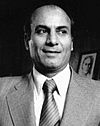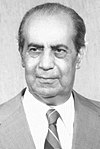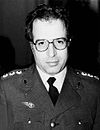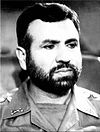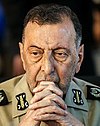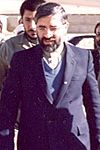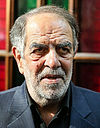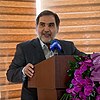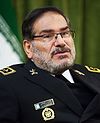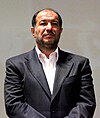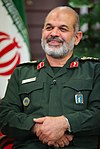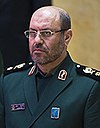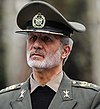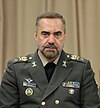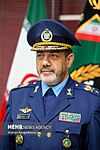Ministry of Defence and Armed Forces Logistics (Iran)
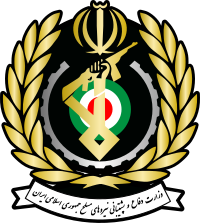 Insignia | |
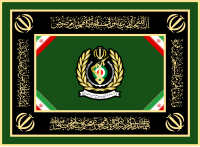 Flag | |
| Agency overview | |
|---|---|
| Formed | 22 August 1989 |
| Type | Government ministry |
| Jurisdiction | Government of the Islamic Republic of Iran |
| Employees | Classified |
| Annual budget | $1.53 billion (2020–21)[1] |
| Minister responsible |
|
| Website | http://www.mod.ir/ |
The Ministry of Defence and Armed Forces Logistics (MODAFL; Persian: وزارت دفاع و پشتیبانی نیروهای مسلح, romanized: vezârat-e defa' va poštibâni-ye niruhâ-ye mosallah) is the defence ministry of Iran and part of the country's executive branch. It thus reports to the President of Iran, not to the Commander-in-Chief of the Iranian Armed Forces.
Unlike many countries, the ministry is not involved with in-the-field military operational command of the armed forces. Instead it is responsible for planning, logistics and funding of the Armed Forces of the Islamic Republic of Iran while the General Staff, a separate institution under command of the supreme leader of Iran, has control over the forces.[2] The MODAFL is also the major player in defense industry of Iran, with multiple conglomerates and subordinates active in research and development, maintenance and manufacturing of military equipment. It annually exports military equipment manufactured in Iran to forces of countries such as Syria, Iraq, Venezuela and Sudan (the latter ceased in 2019), as well as non-state actors like Hezbollah.[3]
The ministry is considered one of the three "sovereign" ministerial bodies of Iran due to nature of its work at home and abroad.[4]
History
[edit]1952–53: Reforms under Mossadegh
[edit]When Mohammad Mossadegh took over the ministry on 21 July 1952, he initiated a series of reforms in the ministry. He named general Ahmad Vossough as his deputy and renamed the ministry from 'War' to 'National Defense', cut the military budget by 15% and vowed to only purchase defensive military equipment.[5] Two investigatory commissions were formed, one for examining previous promotions and the other for materiel procurement.[5] Under Mossadegh, some 15,000 personnel were transferred from the army to the gendarmerie and 136 officers, including 15 general officers, were purged.[5]
1970s procurement
[edit]1982–89: Two ministries
[edit]The Islamic Revolutionary Guard Corps had between 1982 and 1989 its own dedicated defence ministry, mirroring the existing ministry of defence which solely supplied the Islamic Republic of Iran Army during this period. Under President Akbar Hashemi Rafsanjani in 1989, the two ministries were merged into one in order to cease parallel work and reduce interservice rivalry.
Subordinates
[edit]Iranian military industry, under the command of Ministry of Defence, is composed of the following main components:[6]
| Organization | Field of activity |
|---|---|
| Iran Electronics Industries (SAIRAN) | Electronics, communications, e-warfare, radars, satellites, etc. |
| Defense Industries Organization (SASAD) | Tanks, rockets, bombs, guns, armored vehicles, etc. |
| Aerospace Industries Organization (AIO) | Guided missiles systems, etc. |
| Aviation Industries Organization (IAIO) | Aircraft, UAV, helicopters, etc. |
| Marine Industries Organization (MIO) | Ships, hovercraft, submarines, etc. |
| Organization of Defensive Innovation and Research (SPND) | Defense related research and development. |
| National Geographical Organization of Iran (NGO) | Matters related to military maps, national borders and geographical services required by the Armed Forces. |
| Malek-Ashtar University of Technology (MUT) | The ministry's educational institution |
In August 2018, the Iranian Ministry of Defense declared it had unloaded its shares in Wagon Pars and Iran Airtour.[7] In November 2020, the head of the Research and Innovation Organisation of the defence ministry, the nuclear physicist Mohsen Fakhrizadeh, was assassinated in an ambush near Tehran.[8]
List of Ministers of Defence
[edit]| No. | Portrait | Minister | Took office | Left office | Time in office | Defence branch | Cabinet |
|---|---|---|---|---|---|---|---|
| Minister of National Defence | |||||||
| 1 | Commodore Ahmad Madani (1929–2006) | 22 February 1979 | 31 March 1979 | 37 days | Army (Navy) | Bazargan | |
| 2 | Brigadier General Taghi Riahi (1911–1989) | 31 March 1979 | 18 September 1979 | 171 days | Army (Ground Force) | Bazargan | |
| 3 | Mostafa Chamran (1932–1981) | 30 September 1979 | 28 May 1980 | 241 days | IWH | Bazargan Council of the Islamic Revolution | |
| 4 | Colonel Javad Fakoori (1936–1981) | 10 September 1980 | 17 August 1981 | 341 days | Army (Air Force) | Rajai | |
| 5 | Colonel Mousa Namjoo (1938–1981) | 17 August 1981 | 29 September 1981 † | 43 days | Army (Ground Force) | Bahonar Mahdavi Kani (interim) | |
| 6 | Colonel Mohammad Salimi (1937–2016) | 2 November 1981 | 14 August 1984 | 2 years, 286 days | Army (Ground Force) | Mir-Hossein Mousavi I | |
| Minister of Defence | |||||||
| – | Mir-Hossein Mousavi (born 1942) Acting | 20 August 1984 | 21 October 1984 | 32 days | None | Mir-Hossein Mousavi I | |
| – | Colonel Mohammad-Reza Rahimi Acting | 21 October 1984 | 28 October 1985 | 1 year, 37 days | Army (Ground Force) | Mir-Hossein Mousavi I | |
| 7 | Colonel Mohammad Hossein Jalali (born 1936) | 28 October 1985 | 29 August 1989 | 3 years, 305 days | Army (Ground Force) | Mir-Hossein Mousavi II | |
| Minister of Defence and Armed Forces Logistics | |||||||
| 8 | Akbar Torkan (1952–2021) | 29 August 1989 | 16 August 1993 | 3 years, 352 days | None | Rafsanjani I | |
| 9 | Mohammad Forouzandeh (born 1960) | 16 August 1993 | 20 August 1997 | 4 years, 4 days | IRGC | Rafsanjani II | |
| 10 | Rear Admiral Ali Shamkhani (born 1955) | 20 August 1997 | 24 August 2005 | 8 years, 4 days | IRGC (Navy) ↓ Army (Navy) | Khatami I Khatami II | |
| 11 | Brigadier General Mostafa Mohammad-Najjar (born 1956) | 24 August 2005 | 3 September 2009 | 4 years, 10 days | IRGC (Ground Force) | Ahmadinejad I | |
| 12 | Brigadier General Ahmad Vahidi (born 1958) | 3 September 2009 | 15 August 2013 | 3 years, 346 days | IRGC (Quds Force) | Ahmadinejad II | |
| 13 | Brigadier General Hossein Dehghan (born 1957) | 15 August 2013 | 20 August 2017 | 4 years, 5 days | IRGC (Aerospace Force) | Rouhani I | |
| 14 | Brigadier General Amir Hatami (born c. 1965/1966) | 20 August 2017 | 25 August 2021 | 4 years, 5 days | Army (Ground Force) | Rouhani II | |
| 15 | Brigadier General Mohammad-Reza Gharaei Ashtiani (born 1960) | 25 August 2021 | 21 August 2024 | 3 years, 144 days | Army (Ground Force) | Raisi | |
| 16 | Brigadier General Aziz Nasirzadeh (born 1965) | 21 August 2024 | Incumbent | 148 days | Army (Air Force) | Pezeshkian | |
See also
[edit]References
[edit]- ^ Rome, Henry (17 June 2020), "Iran's Defense Spending", The Iran Primer, The United States Institute for Peace
- ^ Forozan, Hesam (2015), The Military in Post-Revolutionary Iran: The Evolution and Roles of the Revolutionary Guards, Routledge, pp. 51–53, ISBN 9781317430742
- ^ Iran Military Power: Ensuring Regime Survival and Securing Regional Dominance (PDF), Defense Intelligence Agency, August 2019, p. 90, ISBN 978-0-16-095157-2, DIA-Q-00055-A
- ^ al Labbad, Mustafa (15 August 2012). "Rouhani's Cabinet Seeks New Balance in Iranian Policies". As Safir. Retrieved 16 August 2013.
- ^ a b c Abrahamian, Ervand (1982). Iran Between Two Revolutions. Princeton University Press. p. 273. ISBN 0-691-10134-5.
- ^ "Iran Electronics Industries (IEI) | Iran Watch". Archived from the original on 22 November 2016. Retrieved 8 April 2015.
- ^ Iran Defense Ministry Claims It Has Divested From Civilian Businesses, Radiofarda.com, 27 August 2018
- ^ Top Iranian nuclear scientist assassinated near Tehran, Aljazeera.com, 27 November 2020
- Ministry of Defense and Armed Forces Logistics (MODAFL)
- Anthony H. Cordesman, Iran's military forces in transition

